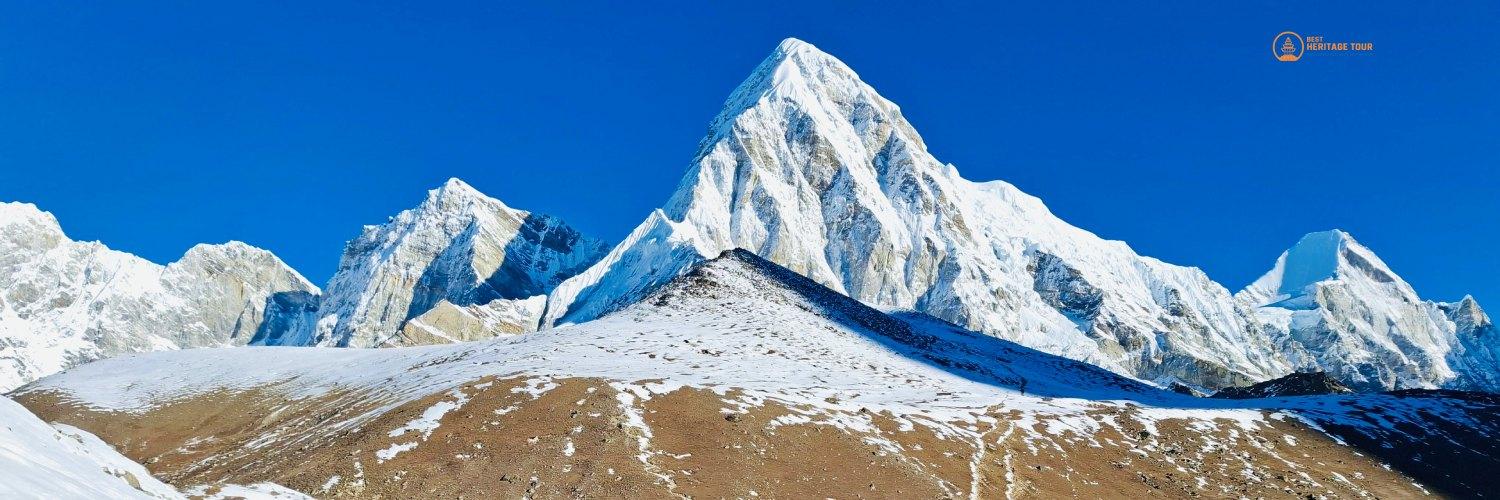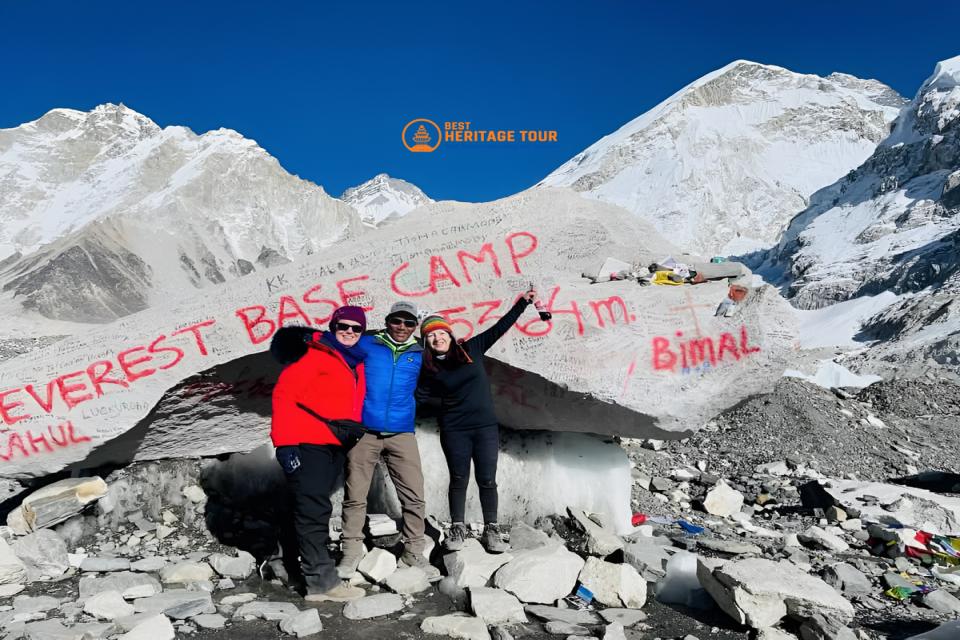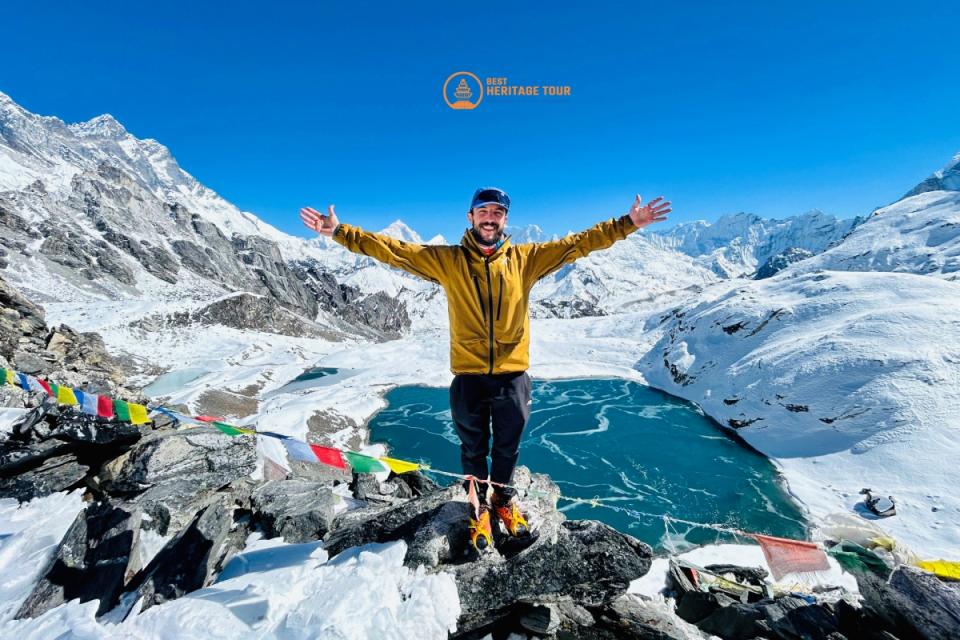The Everest region in Nepal is one of the most celebrated trekking destinations in the world, offering a once-in-a-lifetime experience to walk among the highest peaks on earth. The Everest Base Camp (EBC) Trek is the classic choice - a bucket-list journey that attracts thousands every year. However, for adventure seekers looking for a more extreme challenge, the Everest Three Passes Trek pushes boundaries with its high-altitude passes, remote trails, and unmatched Himalayan panoramas.
Naturally, many trekkers planning their adventure ask: “How hard is the Everest Three Passes Trek compared to EBC?”
The answer depends on several factors: altitude, trek duration, physical demands, weather, facilities, and your level of experience.
In this guide, we’ll break down the key differences, the level of difficulty for each trek, and help you decide which one best suits your goals.
Understanding the Two Treks
Everest Base Camp (EBC) Trek
The Everest Base Camp Trek is one of the world’s most iconic trekking routes. It takes you directly to the base of Mount Everest, allowing trekkers to experience the culture of the Sherpa people, visit ancient monasteries, and walk through breathtaking valleys framed by Himalayan giants.
-
Duration: Typically 12-14 days round trip from Lukla.
-
Highest Point: Kala Patthar (5,545m), a viewpoint offering unparalleled sunrise views of Everest.
-
Route: Lukla → Phakding → Namche Bazaar → Tengboche → Dingboche → Lobuche → Gorakshep → Everest Base Camp → Kala Patthar.
-
Difficulty Level: Moderate. The trek requires stamina and preparation but is achievable for most fit individuals with no prior high-altitude trekking experience.
-
Highlights: Standing at Everest Base Camp, exploring Namche Bazaar, visiting Tengboche Monastery, and panoramic views from Kala Patthar.
The EBC trek is highly popular, meaning you’ll find plenty of teahouses, lodges, and services along the way. It’s also well-marked and structured, making it more approachable for first-time trekkers.
Everest Three Passes Trek
The Everest Three Passes Trek is a far more adventurous version, often referred to as the ultimate circuit trek of the Everest region. It connects all the major highlights - Everest Base Camp, Kala Patthar, Gokyo Lakes, and three major high passes - into one grand loop.
-
Duration: 18-21 days, depending on the pace and acclimatization.
-
Highest Points:
-
Kongma La Pass (5,535m)
-
Cho La Pass (5,420m)
-
Renjo La Pass (5,360m)
-
-
Route: Lukla → Namche → Tengboche → Dingboche → Chhukung → Kongma La → Lobuche → Everest Base Camp → Cho La → Gokyo Lakes → Renjo La → Thame → Namche → Lukla.
-
Difficulty Level: Strenuous. Demanding in terms of altitude, endurance, and physical ability.
-
Highlights: Majestic Gokyo Lakes, crossing glaciers, panoramic views of Everest, Lhotse, Makalu, Cho Oyu, and remote Sherpa villages.
The trek’s real challenge lies in crossing the three high-altitude passes, each above 5,300m, which tests physical stamina, acclimatization, and mental resilience. It’s less crowded than EBC, which enhances its wilderness feel but also makes it more demanding logistically.
Comparing Difficulty: Everest Three Passes vs. EBC
1. Altitude Challenges
Altitude is the biggest hurdle in both treks.
-
EBC Trek: The highest point is Kala Patthar (5,545m), with Everest Base Camp itself at 5,364m. While this is still very high, the trek allows for gradual acclimatization with rest days in Namche and Dingboche. Many trekkers succeed in completing the route with only mild symptoms of altitude sickness.
-
Three Passes Trek: Each of the three passes is above 5,300m, meaning trekkers face multiple exposures to extreme altitude. Unlike EBC, where the ascent is more linear, the Three Passes Trek requires ascending and descending repeatedly over rugged terrain. Oxygen levels are extremely low at these altitudes, making fatigue and headaches common.
Verdict: The Three Passes is far harder in terms of altitude management, and trekkers must be better acclimatized and cautious.
2. Trekking Duration
The length of the trek directly impacts how much physical and mental endurance is required.
-
EBC Trek: With 12-14 days, it is manageable for those on limited time. Each day usually involves 5-7 hours of walking. This duration allows trekkers to plan a shorter holiday while still achieving their dream of reaching Everest Base Camp.
-
Three Passes Trek: Spanning 17-20 days, it requires an extended commitment. Some days involve 8-10 hours of trekking, especially when crossing passes. Trekkers must prepare for physical fatigue building up over three weeks.
Verdict: The Three Passes demands nearly double the time commitment compared to EBC.
3. Physical Demands
-
EBC Trek: Considered moderate, the trek includes long walking days but mostly follows a gradual incline on well-worn paths. Trekkers with a reasonable fitness level can complete it without extreme training.
-
Three Passes Trek: Much more strenuous, involving steep ascents, glacier crossings, and rocky trails. Carrying your pack adds to the challenge, and the remoteness of some sections requires stamina and resilience. It is suitable only for trekkers with previous hiking or multi-day trek experience.
Verdict: The Three Passes is significantly more physically demanding.
4. Weather Exposure
The Himalayan weather can change rapidly, and the higher you go, the tougher the conditions.
-
EBC Trek: The route is relatively sheltered and has many villages with teahouses for rest. The weather, though still harsh at altitude, is easier to manage compared to remote passes.
-
Three Passes Trek: The high passes are particularly vulnerable to heavy snow, strong winds, and icy conditions. Crossing a pass in bad weather is risky, and trekkers often need equipment such as crampons during late autumn or early spring. Trekkers must also be flexible, as weather delays are common.
Verdict: The Three Passes is riskier due to unpredictable weather and challenging terrain.
5. Remoteness and Facilities
-
EBC Trek: Being the most popular trek in Nepal, EBC offers plenty of teahouses, food options, and medical assistance along the way. You will rarely feel isolated.
-
Three Passes Trek: Some sections, particularly between the passes, are remote with very limited lodges and resources. Food is more basic, and trekkers must be self-sufficient. This adds to the adventure but also increases the difficulty.
Verdict: The Three Passes is harder logistically with fewer comforts available.
Who Should Choose the Everest Base Camp Trek?
The EBC trek is perfect if you want to:
-
Experience the classic Everest journey without extreme challenges.
-
Have limited time (12-14 days) for trekking.
-
Prefer a trek with more lodges, comfort, and services.
-
Achieve the bucket-list goal of standing at Everest Base Camp.
In short, EBC is great for first-time high-altitude trekkers or those wanting a manageable Himalayan adventure.
Who Should Choose the Everest Three Passes Trek?
The Three Passes Trek is best for you if:
-
You are an experienced trekker with high-altitude or multi-day trek experience.
-
You want the ultimate challenge in the Everest region.
-
You’re looking for a less crowded, more adventurous, and comprehensive Everest experience.
-
You have at least 17-20 days to dedicate to the trek.
The Three Passes Trek is often described as the “Everest region in one trek”, making it ideal for those seeking the full Himalayan adventure.
Training and Preparation
For Everest Base Camp:
-
Focus on cardio training like running, hiking, and cycling.
-
Build leg strength with squats, lunges, and step-ups.
-
Practice multi-day hikes at home if possible.
For Everest Three Passes:
-
Train for longer endurance, ideally doing multi-day hikes with a backpack.
-
Acclimatization training (trekking at moderate altitude before Nepal) can help.
-
Prepare mentally for isolation, long walking days, and harsh conditions.
Safety Considerations
-
Guided vs. Independent: EBC can be done independently by confident trekkers, but the Three Passes Trek is best with a guide and porter for navigation and safety.
-
Insurance: Always ensure your travel insurance covers trekking above 6,000m and helicopter evacuation.
-
Best Seasons: Both treks are best in spring (March-April) and autumn (October-November). Winter and monsoon are riskier.
Final Thoughts: Which Trek is Right for You?
So, how hard is the Everest Three Passes Trek compared to EBC?
-
EBC Trek = Moderate challenge, ideal for first-time trekkers and those short on time.
-
Three Passes Trek = Strenuous challenge, for seasoned trekkers seeking a complete and adventurous circuit.
Both routes deliver unforgettable Himalayan beauty. The choice depends on your fitness, time, and appetite for adventure.
Book Your Trek with Best Heritage Tour
Whether you choose the classic Everest Base Camp Trek or the challenging Three Passes Trek, having a trusted local operator makes your journey smoother, safer, and more memorable.
Best Heritage Tour offers:
-
Expert local guides and porters.
-
Well-paced itineraries for proper acclimatization.
-
Reliable logistics and personalized service.
-
Emergency support with helicopter evacuation coordination.
Conclusion: Everest Three Passes vs. EBC - Which Will You Choose?
Both the Everest Base Camp Trek and the Everest Three Passes Trek are extraordinary journeys through the heart of the Khumbu region, each offering its own kind of reward. The EBC trek is a classic, accessible, and achievable adventure for trekkers who want to stand at the foot of the world’s tallest mountain without facing extreme challenges. On the other hand, the Three Passes Trek is the ultimate Everest circuit, demanding more stamina, preparation, and time - but rewarding trekkers with a deeper, more remote, and panoramic experience of the Himalayas.
Your choice comes down to what you’re seeking:
-
A manageable yet iconic trek? → Choose EBC.
-
The ultimate test of endurance and adventure? → Choose Three Passes.
No matter which route you take, both treks guarantee breathtaking scenery, rich Sherpa culture, and unforgettable memories. With proper planning, the right gear, and the support of a trusted local operator like Best Heritage Tour, your Himalayan journey will be safe, meaningful, and life-changing.
Contact Best Heritage Tour:
Phone: +977-9851149197 / +977-9810043046
Email: info@bestheritagetour.com / bestheritagetour@gmail.com
Booking/Info: www.bestheritagetour.com
Office: Thamel Marg, Kathmandu, Nepal
With Best Heritage Tour, you’re not just trekking - you’re experiencing the heart of the Himalayas with safety and confidence.
Author: Best Heritage Tour
Date: 25th August, 2025



